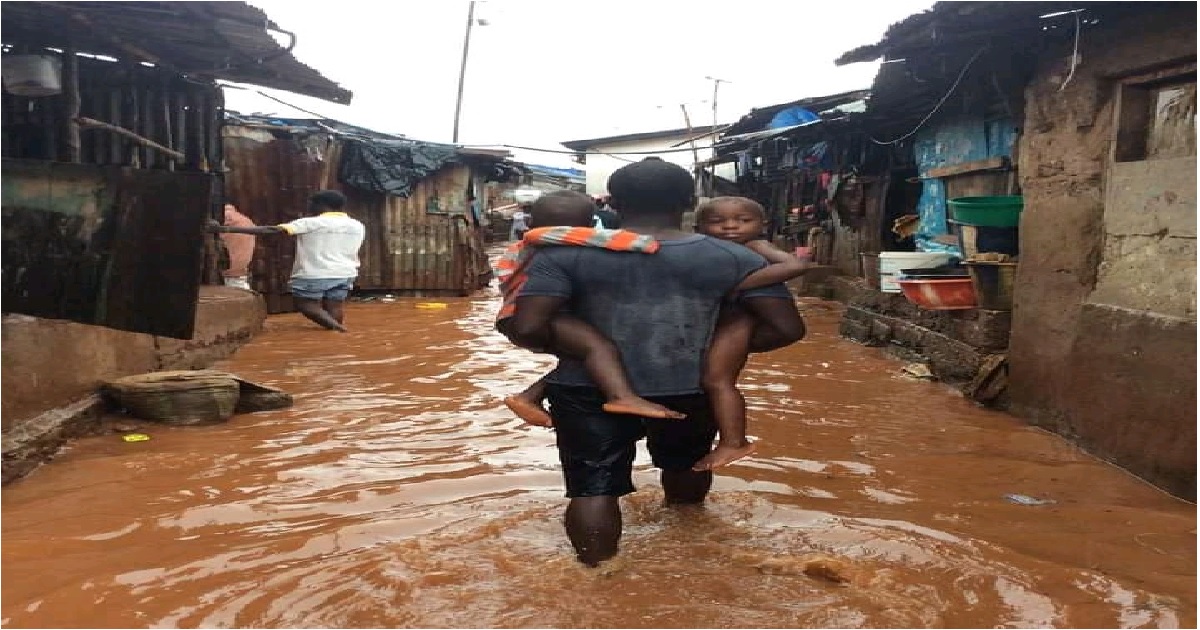It is July, a normal day, time is 11-pm. The KrooBay Community in its characteristic haste, wakes up with a wild hustle and bustle. It’s drumming hard here, and the area is gripped with claws of floods. There follow creaking doors, voices of despair and a staccato of footsteps as many adults are bobbed up from their streams of sleep. Not so for children, however, some are still deeply asleep, perhaps dreaming and thrashing about in ecstasy of sleep.
KrooBay is among the largest urban slum in Sierra Leone. It’s strategically located in the heart of the country’s capital’s Freetown. It is an informal settlement located on the coastal line with an estimated population of over 13,000 dwellers. According to Merriam Webster, the definition of a slum is a densely populated usually urban area marked by crowding, dirty run-down housing, poverty and social disorganization. The KrooBay slum community is an apt description of the said definition of a slum. In KrooBay, Poverty is not an abstract noun because visitors and dwellers can see it, feel and even touch it. It lacked almost everything.
Residents of the community have an abiding memories of flooding during the rainy season. Overtime, some of these memories have become an indelible imprint on the minds of the dwellers within the community. The Raining season in Sierra Leone begins with sudden rainstorm carried by strong winds from the highlands. The rainfall becomes heavy and more frequent between July and September, with flooding ravaging the community. The rainfall decreases towards the end of September. Thunder and lightning are usually frequent at the start and the end of the Rainy Season.
And truth be told, despite the spate of frequent flooding during the rainy season in the community, the September 2015 flooding in Sierra Leone was devastating for KrooBay. Bridges, houses, schools and properties worth millions of Leones were destroyed by the floods. Dwellers were drenched, shedding tears and others trembling in their emaciated bones. These frequent flooding are shameful reminders that previous and present government have been neglecting the second generation of human rights of their citizenry. Government can guarantee these rights by striving to provide equal conditions and treatment. Secondary rights may include a right to be employed in just and favorable conditions, right to food “Housing” and health care.
Like 45 years old Mohamed conteh, a father of three, vividly recalled his ordeals on that fateful day, ” the rain started in the morning. First there were mild showers, then a thunderstorm, and it changed to torrential rainfall. I was asleep with my wife and two children when I heard a clattering sound. Someone was throwing stones on my roof.I heard my neighbor calling my name. When I opened the window, I saw the water. It was all around our house. I got my wife and two children by breaking open the zinc roof. It was still raining and the whole KrooBay community was in a state of confusion. After taking my children in a safe place, I went back to Spain, where my son’s fiance lived with my seven -month-old granddaughter.
My son’s wasn’t around. He had gone to the east end of Freetown to honor a football match. The water had not reached the other side, but I told the mother to evacuate. She was playing a game of Ludo while the child was inside the house and asked me ” do you not believe in God” I said I would take my granddaughter with me . But she refused, and I went away. As it continued to rain, I got more worried and I returned to their house again everybody was crying . I learnt that a mud house had collapsed nearby.
My granddaughter was trapped inside. We could not save her. When the water went down, I was able to recover my grand daughter’s body. I took her to the Connaught Mortuary. I told the mother and her family members they were responsible for my child’s death. She would have lived if they had let me take her . She was my first grandchild. My son was 17years old when he got the girl pregnant. I had to struggle to take care of the mother and the baby. I bought napkins, towel, and flasks. I organised the naming ceremony . I sometimes feel I could have done more to save the life of that child….But as a Muslim, we cannot question the will of Allah.
The major cause of the flooding in our community is the poor drainage system. The drains are not deep. So water overflows into our houses. Some people have also constructed houses that disturb the flow of water. I am calling on the government and International organizations to help us dig, to expand the drainage system. And construct strong walls that will prevent flooding. If we do not do this, we will always continue to suffer from flooding during rainy season.
September is not a good month! It is the most disastrous month for me. The rains are heavy and it is the month that took away my granddaughter”
For now, Mohamed keep body and soul with his family by making cooking pots from used aluminium metals for survival, and the work to rehabilitate the community still awaits.


 Post a comment
Post a comment








